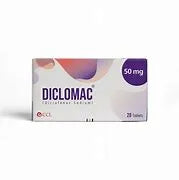Diclofenac Potassium Tablets for Pain Relief and Inflammation
Diclofenac Potassium Tablets are a powerful medication designed to alleviate mild to moderate pain and inflammation. This nonsteroidal anti-inflammatory drug (NSAID) is effective in managing symptoms of various conditions, including rheumatoid arthritis, osteoarthritis, ankylosing spondylitis, acute musculoskeletal pain, postoperative pain, dysmenorrhea (painful menstruation), and migraine attacks.
How It Works
Diclofenac works by blocking the production of certain natural substances in your body that cause inflammation. This action helps to reduce swelling, pain, and fever, making it easier to perform daily activities.
Uses
- Pain Relief: Diclofenac is used to relieve mild to moderate pain from headaches, dental pain, menstrual cramps, and muscle aches.
- Inflammation Management: It reduces inflammation and joint stiffness associated with conditions like osteoarthritis and rheumatoid arthritis.
- Menstrual Cramps: Effective in treating dysmenorrhea, which is painful menstruation.
- Migraine Attacks: Helps in reducing the severity of migraine attacks.
How to Take It
- Dosage: Typically taken 2-4 times a day as directed by your doctor.
- Administration: Swallow the tablet whole with a full glass of water (8 ounces/240 milliliters). Do not lie down for at least 10 minutes after taking the medication.
- Stomach Upset: If you experience stomach upset, take the medication with food, milk, or an antacid.
Side Effects
Common side effects include upset stomach, nausea, heartburn, diarrhea, constipation, gas, headache, drowsiness, dizziness, or blurred vision. If any of these effects last or worsen, inform your doctor or pharmacist promptly.
Important Information
- Blood Pressure: This medication may raise your blood pressure. Regularly check your blood pressure and inform your doctor if the results are high.
- Liver Damage: Diclofenac may rarely cause serious liver disease. Seek medical help immediately if you experience nausea/vomiting that doesn’t stop, loss of appetite, stomach/abdominal pain, yellowing eyes/skin, or dark urine.
- Allergic Reactions: A very serious allergic reaction is rare but requires immediate medical attention if you notice fever, swollen lymph nodes, rash, itching/swelling (especially of the face/tongue/throat), severe dizziness, or trouble breathing.
Precautions
- Kidney Problems: NSAID medications like diclofenac can sometimes cause kidney problems. Drink plenty of fluids as directed by your doctor to prevent dehydration and inform your doctor right away if you have pink/bloody urine or any unusual change in the amount of urine.
- Alcohol and Marijuana: This drug may make you dizzy or drowsy or cause blurred vision. Avoid driving, using machinery, or performing any activity that requires alertness or clear vision until you can do it safely. Limit alcoholic beverages and avoid using marijuana (cannabis).
Consult Your Doctor
Before taking diclofenac, inform your doctor about any pre-existing diseases or ongoing medications. If you experience any serious side effects, notify your doctor promptly. For optimal results, continue taking the tablet for the duration prescribed by your doctor.




Reviews
There are no reviews yet.